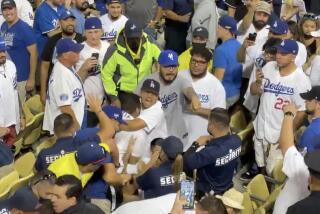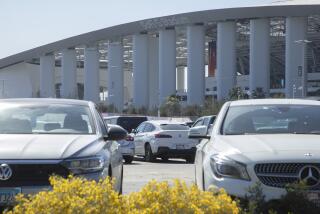Surgeon testifies Stow will need round-the-clock aid for the rest of his life
- Share via
A neurological surgeon who evaluated Giants fan Bryan Stow testified Friday that the former paramedic would need around-the-clock assistance for the rest of his life as a result of the devastating injuries suffered in a beating outside Dodger Stadium on opening day in 2011.
Dr. William Caton, chief neurosurgeon at Huntington Memorial Hospital in Pasadena, said Stow still requires constant rehabilitation, despite the life-saving medical procedures he underwent to stabilize his condition.
A year ago, Stow was moved back to his family’s home near Santa Cruz because his insurance would no longer pay for 24-hour care at the Center for Neuro Skills in Bakersfield. At the time, his family said he could have benefited from more time at the center.
“My thought is he should have a similar situation that he had in Bakersfield,” Caton testified.
The testimony comes in an ongoing civil trial that pits Stow against the Los Angeles Dodgers and former owner Frank McCourt.
Though two Rialto men have pleaded guilty in the assault, the lawsuit contends that poor security and dim lighting in the stadium parking lot created an environment that left the Giants fan vulnerable.
The costs of Stow’s medical care have mounted, and his lawyers said in an earlier court filing that total expenses could exceed $50 million.
Caton, who did not operate on Stow but has recently started treating him, described in graphic terms the immediate efforts to decompress the swelling in Stow’s brain.
Immediately after he was attacked on opening day, Stow was taken to Los Angeles County-USC Medical Center, where a tube was placed into his skull. Stow’s condition deteriorated rapidly, Caton said, to the point that surgeons had to remove part of his skull.
Eventually a shunt was permanently inserted to divert fluid. Stow will be dependent on the shunt for the remainder of his life, Caton said.
Doctors’ efforts were complicated by blood clotting in Stow’s brain. Today, Stow still has to take blood thinners to prevent coagulation of his blood, Caton said. Last year, Stow was hospitalized because of a blood clot in his leg.
Stow also must be constantly monitored because of the threat of seizures, Caton said. On Thursday night, Caton said he was told Stow had just suffered another seizure.
“He’s still sick,” Caton said. “He needs our help.”
In further testimony on Friday, the Dodgers’ head of security said during cross-examination that there were no complaints of misconduct in the section of the stadium where Stow and he friends were seated. Witnesses had earlier testified that Stow and his friends were heckled inside the stadium before being attacked in the parking lot.
“We count on fans at times to report misconduct,” said Shahram Ariane, who was working as a consultant the night of the attack and is now the team’s top security official.
During the trial, an attorney for the Dodgers has repeatedly referred to the team’s fan code of conduct. The first provision outlines ways fans can report inappropriate behavior, which neither Stow nor his friends apparently did that day.
More to Read
Sign up for Essential California
The most important California stories and recommendations in your inbox every morning.
You may occasionally receive promotional content from the Los Angeles Times.














